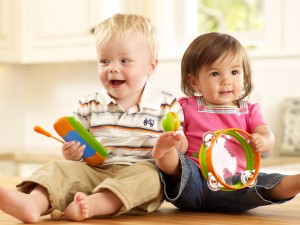This article was written for Kidspot by Nicole Madigan with additional information from BabySmiles.
 Few of us would dispute the joy and personal benefits gained from listening to music. And it’s not just in our minds, it's a scientific fact. According to experts, studies have shown that listening to music is in fact rewarding to the brain. Stating musical appreciation brings particular benefits to babies and children.
Few of us would dispute the joy and personal benefits gained from listening to music. And it’s not just in our minds, it's a scientific fact. According to experts, studies have shown that listening to music is in fact rewarding to the brain. Stating musical appreciation brings particular benefits to babies and children.
“It’s been shown that listening to music actually releases dopamine, which is triggered by the pleasure centre in our brain,” says psychologist Nicole Pierotti. This chemical affects our mood, giving us pleasure, while melody and rhythm can trigger feelings in our brain from sadness to joy.
An age-old pleasure
If you go back in time, music has to be one of our most primitive experiences. It is far more than entertainment, it increases our learning and our intelligence. According to Pierotti, listening to music is particularly beneficial to children, even babies. “Music is often talked about as a ‘super food’ for the brain as the benefits are enormous and cover such a variety of cognitive areas unlike any other stimulation. Music stimulates both sides of the brain at the same time – the left the creative side and the right the logical side.”
Music and intelligence
But it takes more than purely listening to music to really reap the benefits, despite previous theories such as the Mozart Effect. “The Mozart Effect was misinterpreted and people thought that just by listening to classical music a child's brain would grow in intelligence," says Pierotii. "Listening to music has a whole heap of benefits, however, the effects on the brain are temporary. Further research went on to show that actual ‘participation’, being taught music, has the long-lasting benefits talked about in the Mozart Effect. Classical music is much more complex in structure and harmony and this is why classical music ‘gets the brain ready for other intellectual tasks'."
Developing musical intelligence
It’s clear just by watching children sing and dance that children of all ages innately love music. They also love to be part of making the music: newborns love their rattles, while toddlers love their shakers, drums and tambourines. There are plenty of great ways to encourage your child’s musical intelligence, says Pierotti.
- Create a musical box where you start a collection of musical instruments. Be sure to include musical instruments, shakers, whistles and drums from other cultures.
- Visit a World Vision or Oxfam shop to find some really different and interesting noise-makers from around the world. The sounds can be quite different and melodic.
- Start early. Children of all ages love to dance. Pick your baby up and put on some music and dance around the lounge room with them. For older children, put on their favourite music and dance around. While they're having fun, they're learning.
- Listen to different beats: fast-moving, slow-moving.
- Go to your local library and borrow CDs of music from different cultures: Latin, Scottish, Brazilian or Irish. Your children will love and benefit from the different music.
Sing, sing a song
“Music can be part of your routine,” says Pierotti. “You can sing a certain song at tidy up time, sing a song or listen to music when lights are off and when you say goodnight. Music is calming and if used as part of a routine brings calmness.”
Other tips include:
- Sing songs that have hand and finger movements such Incy Wincy Spider, Wheels on the Bus, or Twinkle Twinkle.
- Look for opportunities to use and listen to music: while travelling in the car, put on some great sing-a-long songs and sing as you drive. Enjoy yourself and your child will, too. Make up your own songs as well and encourage your child to add words or change the beat.
- Enjoy yourself. Have fun and your child will too, all the while developing their musical intelligence and interests.
This article was written for Kidspot by Nicole Madigan with additional information from Baby Smiles.

